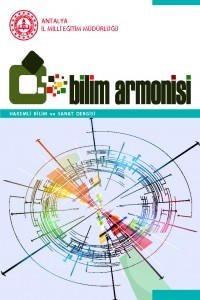Özel Yetenekli Öğrencilerin Çalışma Davranışlarının İncelenmesi
Bilim ve sanat merkezi, çalışma davranışı, özel yetenekli öğrenci
Examining the Study Behaviors of Special Talented Students
___
- Arslantaş, M. (2001). “Ortaöğretim öğrencilerinin ders çalışma alışkanlıkları (Diyarbakır örneği)”. Yayınlanmamış Yüksek Lisans Tezi, Dicle Üniversitesi, Diyarbakır-Türkiye.
- Baltaş, A. (2019). Stres Altında Ezilmeden Öğrenmede ve Sınavlarda Üstün Başarı: Remzi Kitabevi. İstanbul-Türkiye.
- Holtzman, W. H., Brown, W. F. (1968). “Evaluating the study habits and attitudes of high school”. students. Journal of Educational Psychology, 59(6): 404–409. https://doi.org/10.1037/h0026438
- Burson, C.D. (1985). “A Comparison of study habits and attitudes of academically successful and academically unsuccessful American Indian students in higher education”. Yayımlanmış Doktora Tezi, Northern Arizona University. Arizona-USA.
- Büyüköztürk, Ş., Kılıç Çakmak, E., Akgün, Ö. E., Karadeniz, Ş., Demirel, F. (2017). Eğitimde Bilimsel Araştırma Yöntemleri: Pegem Akademi. Ankara-Türkiye.
- Gagne, F. (1985). “Giftedness and talent: Reexamining a reexamina-tion of the definitions”. Gifted Child Quarterly, 29(3): 103-112.
- Gettinger, M., Seibert, J.K. (2002). “Contributions of study skills to academic competence”. School Psychology Review, 31(3): 350-365.
- Ghulam, M. (2013). “Study behavior, study habits, achievement motivations of university students and study advisory services”. Literacy Information and Computer Education Journal, 4: 999-1006.
- Güngör, G. (2010). “İlköğretim düzeyindeki öğrencilerin benlik kavramlarının ve çalışma alışkanlıklarının değerlendirilmesi”. Yayınlanmamış Yüksek Lisans Tezi, Gazi Üniversitesi, Ankara-Türkiye.
- Gürpınar, E., Güzeller, C.O., Alimoğlu, K., Kulaç, E. (2011). “Tıp fakültesi öğrencilerinin çalışma davranışlarının ve çalışma davranışı değerlendirme ölçeğinin psikometrik niteliklerinin belirlenmesi”. Süleyman Demirel Üniversitesi Tıp Fakültesi Dergisi, 18(3): 96-99.
- Hamblin, D. (1981). Teaching study skills. Oxford: Blackwell.
- Hong, E., Milgram, R.M. (1999), “Preferred and actual homework style: a crosscultural examination”. Educational Research, 41: 251-265.
- Jackson, P. F., Reid, N. A. & Croft, C. A. (1979). Manual for the Study Habits Evaluation and Instruction Kit: SHEIK. Wellington: New Zealand Council for Educational Research.
- Jiao, Q. G., Onwuegbuzie, A. J. (2001). Library Anxiety and Characteristic Strengths and Weaknesses of Graduate Students’ Study Habits, Library Review, 50(2).
- Karasar, N. (2019). Bilimsel Araştırma Yöntemi: Nobel Akademi. Ankara-Türkiye. Kerr, B. (1991). A handbook for counseling the gifted and talented: American Counseling Association. Vatikan-Italy.
- Keskin, M. Ö., Samancı, N. K. & Aydın, S. (2013). “Science and art centers: Current status, problems and solution proposals”. Journal of Gifted Education Research, 1(2): 78-96.
- Küçükahmet, L. (2008). Öğrencilerin çalışma alışkanlıkları ve tutumları. Ankara-Türkiye. Lewis, R.B., Doorlag, D.H. (1999). Teaching special students in general education classrooms: Prentice Hall. Upper Saddle River-USA.
- Lewis, R.B., Doorlag, D.H. (1999). Teaching special students in general education classrooms: Prentice Hall. Upper Saddle River-USA.
- Memiş, A. (2007). “Öğrencilerin çalışma oryantasyanlarını etkileyen demografik faktörler”. Türk Eğitim Bilimleri Dergisi, 5(2): 291-321.
- Millî Eğitim Bakanlığı. (2019). “Bilim ve sanat merkezleri yönergesi”. Tebliğler Dergisi. Yayım Tarihi: Mart 2009. Sayısı: 2618.
- Mullen, S. K. (1995). “A study of the difference in study habits and study attitudes between college students participating in experiential learning using portfolio assessment method of evaluation and student not participating in experiential learning. Southwestern Baptist Theological Seminary”, Doctoral Thesis, School of Religious Education.
- Nadinloyi, K. B. , Hajloob, N., Garamaleki, N. S. & Sadeghid, H. (2013). “The study efficacy of time management training on increase academic time management of students”. Procedia-Social and Behavioral Sciences, 84: 134-138.
- Peterson, J. S. ve Colangelo, N. (1995). “Gifted achievers and unde-rachievers: A comparison of patterns found in school files”. Journal of Counseling and Development, 4: 399-414.
- Reis, S. (1998). “Underachieving for some. Dropping out with dignity for others”. Communicator, 29 (1): 19-24.
- Renzulli, J. S. (2018). “Identifying key features in programs for the gifted”. Exceptional Children, 35(3): 217–221.
- Renzulli, J. S., Park, S. (2002). “Giftedness and high school dropouts: Personal, family, and school-related factors (RM02168). Storrs, CT: The National Research Center on the Gifted and Talented”, University of Connecticut.
- Robinson, F. P. (1974). Effective study. London: Harper & Row.
- Sak, U. (2012). Üstün Zekâlılar Özellikleri Tanılanmaları Eğitimleri: Maya. Ankara-Türkiye.
- Sternberg, R.J. (1989). “Domain-generality versus domain-specificity: The life and impending death of a false dichotomy”. Merrill-Palmer Quarterly, 35: 115-130.
- Şenol, C. (2011). “Üstün yetenekliler eğitim programlarına ilişkin öğretmen görüşleri BİLSEM örneği”. Yayımlanmış Yüksek Lisans Tezi, Fırat Üniversitesi, Elazığ-Türkiye.
- Tinklin, T. (2003). “Gender Differences and High Attainment”. British Educational Research Journal , 29 (3).
- Tuna Cesim, D., Korkmaz, M., Gümüşdağ, H., Aras, G. (2013). “Sınıf tekrarı yapan ortaöğretim öğrencilerinde görülen başarısızlık nedenlerinin çalışma davranışı ve sınav kaygısı değişkenleri açısından incelenmesi uygulamalı Ankara örneği”. Uluslararası Aile Çocuk ve Eğitim Dergisi, 1: 59-78.
- Uluğ, F. (2000). Okulda Başarı Etkili Öğrenme ve Ders Çalışma Yöntemleri: Remzi Kitabevi. İstanbul-Türkiye.
- Wolfenden, M. H., Pumfrey, P. D. (1985). “Students’ study behaviour; a review of research part A”. Educational Psychology in Practice, 1(3): 91-98.
- Yılmaz, M., Yılmaz, T. (2021). “Yönetici ve öğretmenler gözünden Bilsem’lerde verilen eğitimlerin kritiği”. International Review of Economics and Management, 9(1): 1-27.
- ISSN: 2602-4403
- Yayın Aralığı: Yılda 2 Sayı
- Başlangıç: 2018
- Yayıncı: Antalya İl Milli Eğitim Müdürlüğü
Sabun Baloncuğu Modeli ve Menelaus ile Gösterimi
Tolgahan BOSTAN, Aliye BOSTAN, Uğur EROĞLU
Yıldız LEBLEBİCİER, Arda AKINCI
Çıtır Çıtır Felsefe Serisi Adalet ve Haksızlık Kitabında Adalet Değeri
Özel Yetenekli Öğrencilerin Çalışma Davranışlarının İncelenmesi
Oktay KILIÇ, Hüseyin Kadir YÜKSEL, İlker GÖNEN, Hasan AKDENİZ, Güven YILDIZ, Sadık EFE
Yüzüklerin Efendisi Örneği Üzerinden Fantastik Romanlarda Gerçeklik
Begüm Naz YÜKSELEN, Işıl KORKMAZ, Aydın YÜKSEK
Nur Sena ERGÜN, Zeynep Bilge SARICA, Emine ALTINSOY, Filiz TANRISEVDİ
